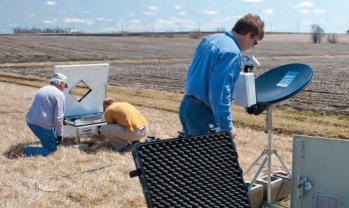Chapter: Avionics and Instrumentation Technologies, new invention technology, Research project papers,
Portable Data Acquisition SysTem (PDAT)

Portable Data Acquisition SysTem (PDAT)
Armstrong
researchers have developed a PDAT that can be easily transported to and set up
at remote locations to display and archive data in real time. The PDAT was
developed to collect data from strain gauges and fiber optic sensors installed
on a revolutionary wing flap while it was being constructed by NASA partner
FlexSys Inc. in Ann Arbor, Michigan, as part of the Adaptive Compliant Trailing
Edge (ACTE) project. The PDAT enabled the Armstrong team to monitor and analyze
data during the construction process and provide vital feedback to designers on
site at FlexSys instead of having to wait until construction was completed and
shipped to Armstrong's facility.
Work to date: This unique and
flexible system has 64 channels for analog data, 32 channels for
thermocouples, and 6,000 parameters of fiber optic data. It is currently
configured to gather strain gauge and thermocouple inputs, but a variety of
other hardware can be installed, including cards for pressure transducers,
voltages, currents, motion packs, accelerometers, MIL-STD-1553 and ARINC 429
aircraft data buses, and Ethernet packets.
Looking ahead: The PDAT has been an
integral part of the ACTE project and is versatile enough to become
a successful component of many current and future Armstrong projects.
Benefits
Convenient: This
innovation enables real-time analysis of data collected at remote locations.
Portable: The hardware is easily
removable, attaches to a single heat-sink pallet, and fits into a single
small case for quick transport. It can be used in a variety of locations,
including laboratory, hangar, and flight line.
Flexible: The technology can
be quickly reprogrammed to support various tests, and it can display and
archive data from virtual streams.
Avionics and Instrumentation
Technologies
Armstrong innovators design and integrate data
acquisition systems for research, support, and one-of-a-kind platforms. In many
cases, these systems leverage commercial off-the-shelf parts to keep costs low
and ease integration with legacy systems. At the same time, these cutting-edge
data systems are finding innovative ways not only to collect data efficiently
but also to flexibly configure collection parameters.
Designed for aerospace applications, many of
these innovations can benefit numerous industries in a variety of situations
where data optimization is critical, such as manufacturing operations, business
processes, and energy management, to name a few.
Related Topics